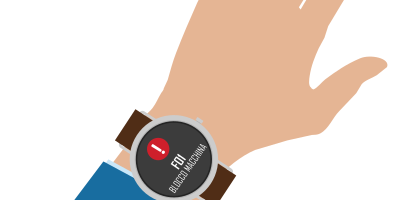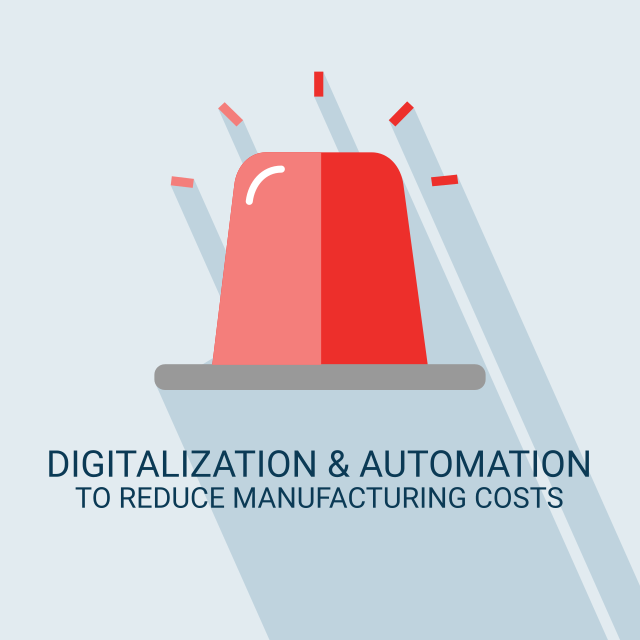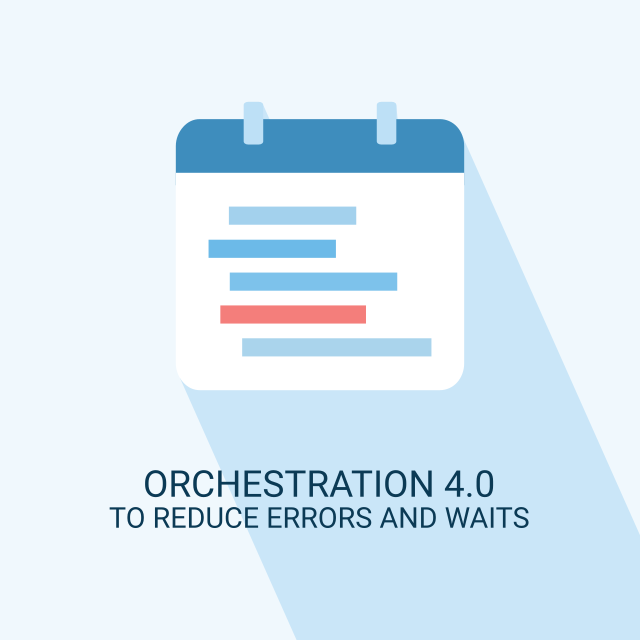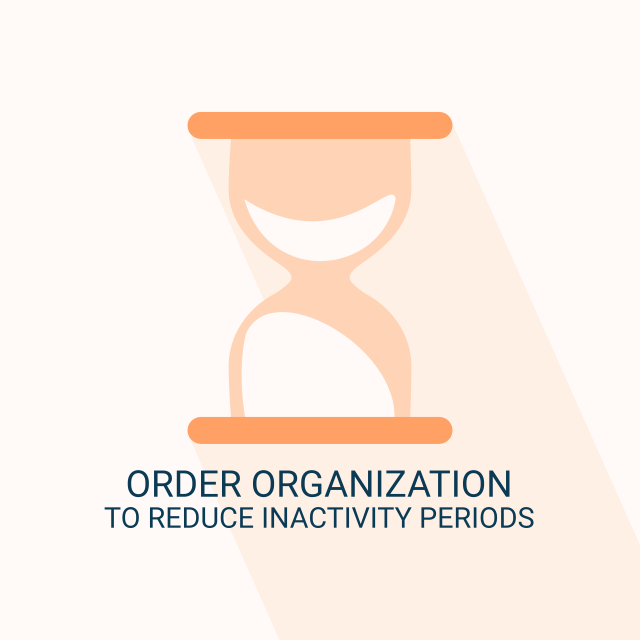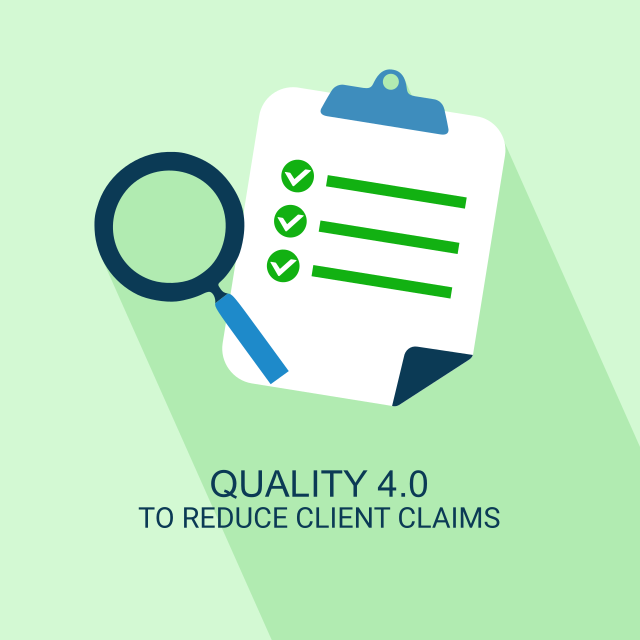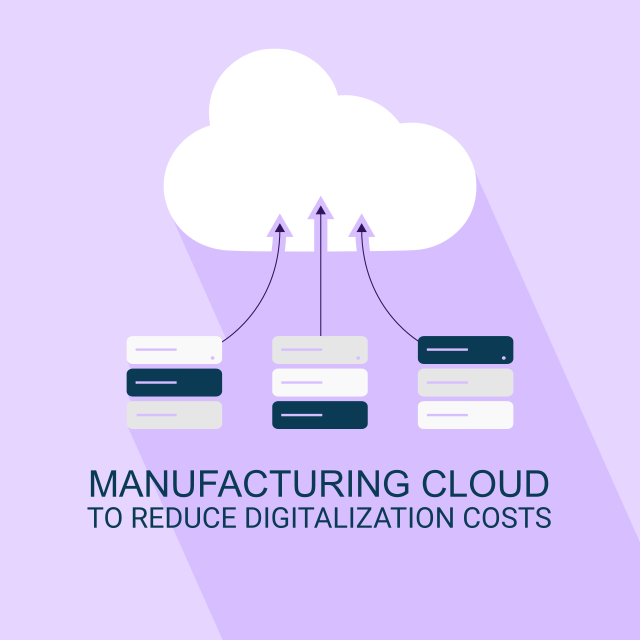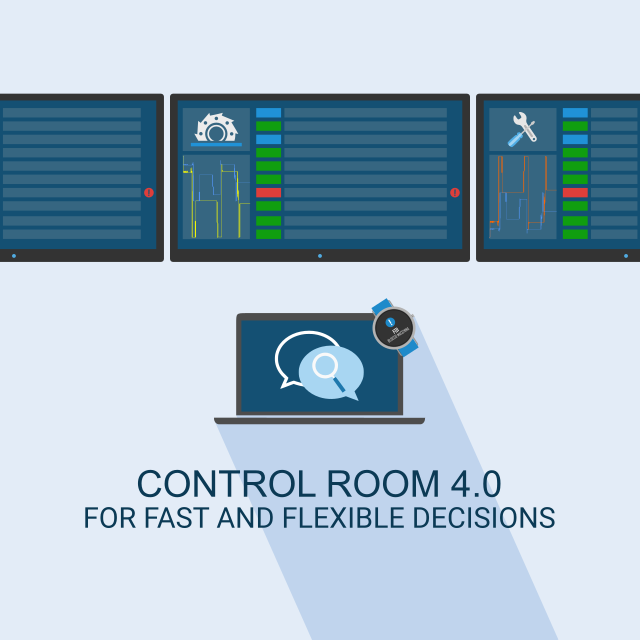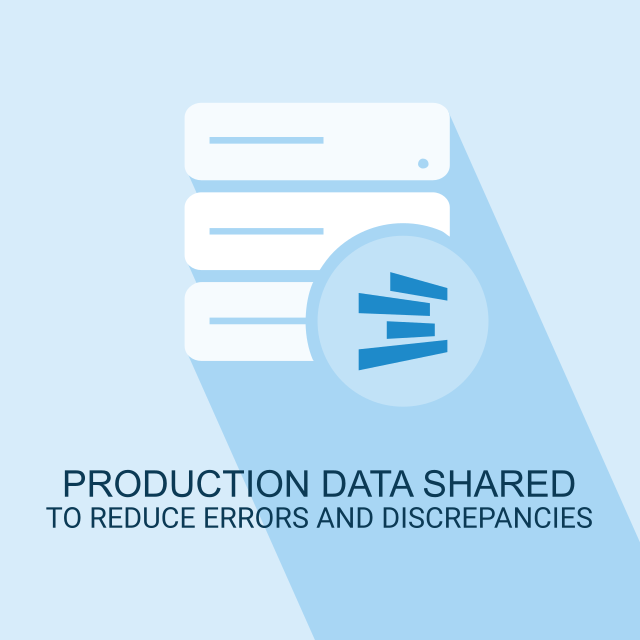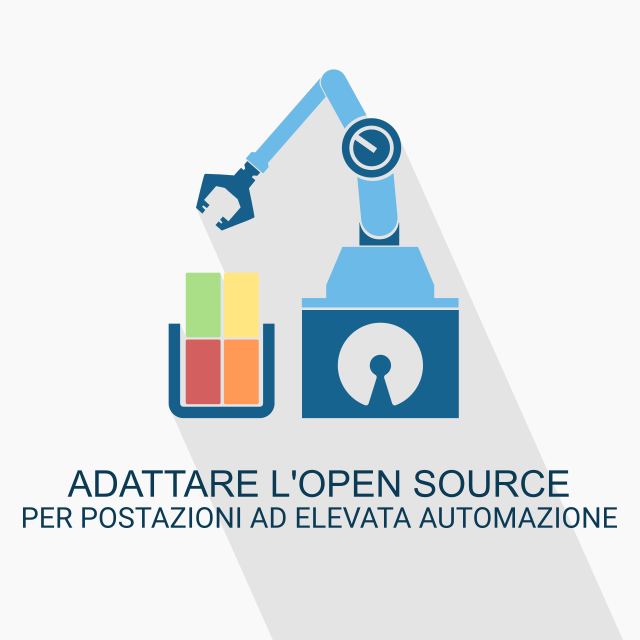Create an interconnected ecosystem 4.0 in your factory!!
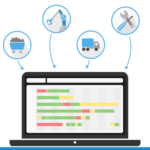
ALL-IN-ONE PLANNING
materials, production, equipment, logistics
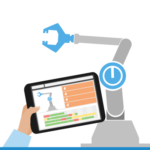
TOOLING 4.0
planning, and management of equipment
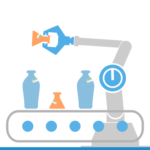
AUTOMATIC HANDLING
Integration with material handling system and robots
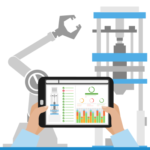
REMOTE MONITORING AND CONTROL
machinery, equipment, items (IoT)
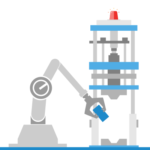
HIGHLY AUTOMATED DEPARTMENTS
according to Industry 4.0
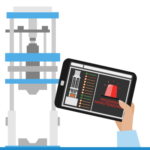
MANTENANCE AND PREDICTIVE DIAGNOSTICS
big data and machine learning

360° INTEGRATION SYSTEM
of robots, machinery and auxiliary systems
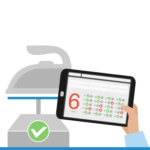
QUALITY 4.0
checks, audits and non-compliances
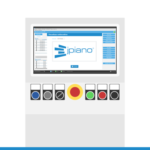
SUPERVISOR DEVELOPMENT
to be integrated into machines
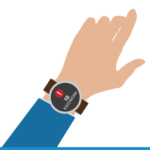
REAL TIME NOTIFICATIONS
on wearable devices
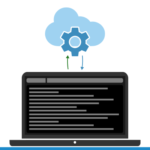
EDGE COMPUTING
industrial apps to always control the factory
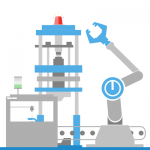
MACHINERY & EQUIPMENT MANUFACTERS
industrial apps to mopnitor plants and equipments
Solutions 4.0
We provide solutions to integrate and jointly manage all the factory's activities from planning to production and logistics in order to support the management in achieving corporate growth objectives and to increase production efficiency by solving, thanks to digitalisation, small and large departmental problems.
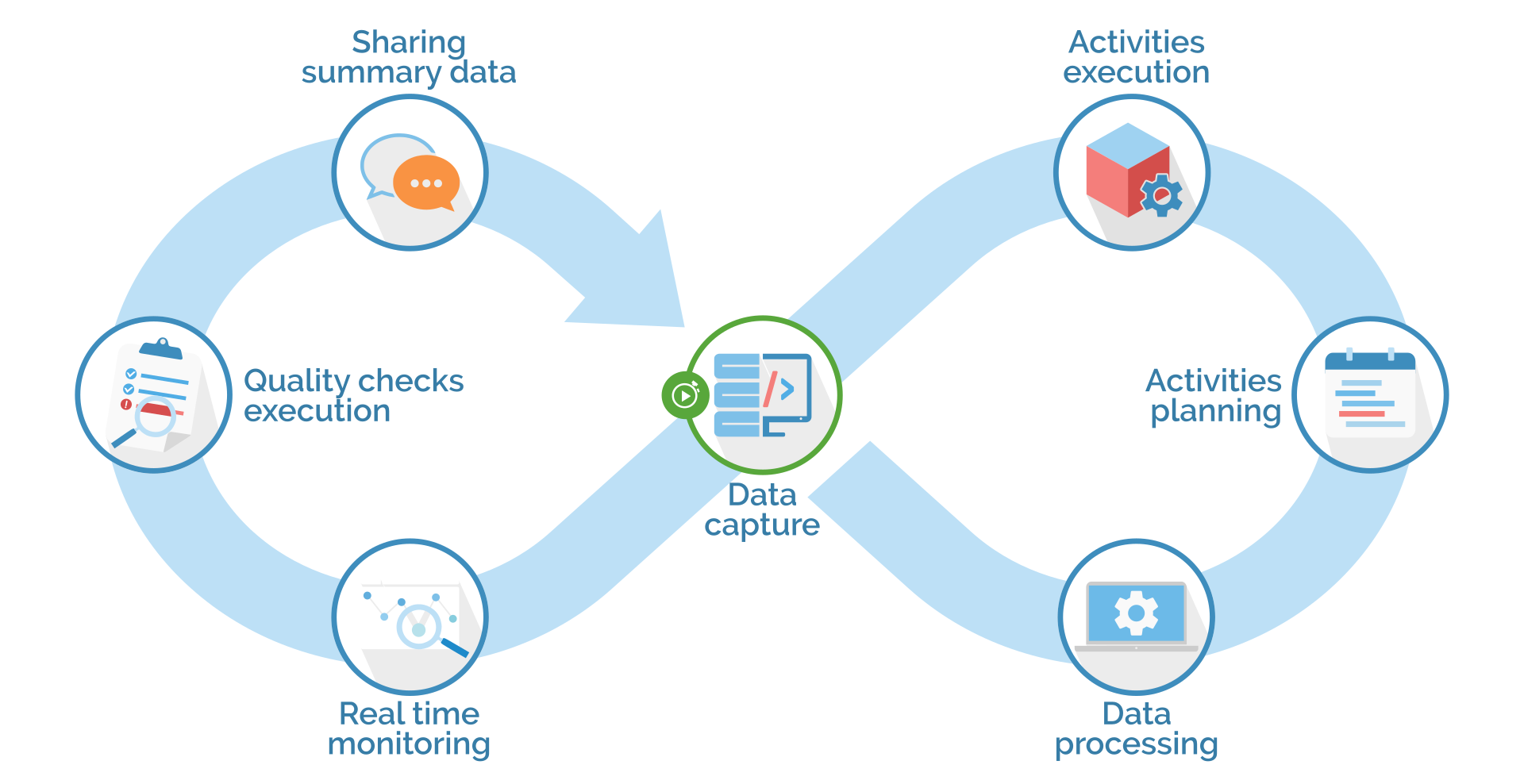
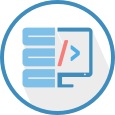
Data capture
We provide latest generation of highly flexible tools to:
- integrate themselves with software solutions and hardware devices already present in the company or at remote plants
- capture constantly updated production and process data.
In addition to ensuring connectivity with traditional consolidated technologies, we are able to apply the IoT - Internet of Things- paradigm to the industrial reality in order to facilitate the dialogue between plants and intelligent devices, like smart devices or cloud technologies.
Through a MES system we are able to establish a bidirectional dialogue with departments and acquire data relating to:
- processes (pressures, temperatures, torques, currents, speeds)
- products (quantity, times)
- alarms and / or blocks.
In particular, thanks to our MES jpiano® platform, we integrate with:
- connectors of industrial terminals - PLC, CNC, SCADA, HMI - most widespread, such as Siemens®, Fanuc®, Omron®, Mitsubishi®, Codesys®
- machinery, electronic devices and printed circuit boards held by the customer that communicate via Euromap protocols, OPC-UA, MQTT, RESTFUL web service
- open source hardware technologies such as Arduino® boards and Raspberry® boards for the realization of advanced workstations with low economic impact
- technologies belonging to the IIoT paradigm, Industrial Internet of Things, such as smartwatch and industrial tablet.
Our MES solutions are able to dialogue with both customized management solutions and the most common ERP software thanks to advanced interfacing procedures. For example ERP software like:
- SAP R3;
- JD Edwards Oracle;
- MS Dynamics NAV;
- Zucchetti;
- OpenERP;
- customized management solutions.
Our Production planning and Manufacturing control applications integrate with other types of programs, according to the company's needs. In particular, we have specific skills on:
- Business Intelligence (BI), for data analysis, always keeping the main information and company performance under control;
- Enterprise Content Management (ECM), for global management of corporate content and information;
- Customer Relationship Management (CRM), for the management of business opportunities and customer assets;
- Enterprise Resource Planning (ERP), for the integrated management of the company;
- Product Lifecycle Management (PLM), for product information management.
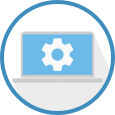
Data processing
We design and develop solutions that allow us to process data come from different sources.We use interfacing procedures capable of operating in real time automatic mode, during which the MES system notices any changes regarding production and process data coming for example from management software and performs alignment, in scheduled mode and on request of users. Data import is a regenerative process: for this reason at each acquisition the system updates the data present with the newly acquired data.
Any errors both during import and export are notified through system notices, text messages and e-mails.

Planning
We provide suitable tools to plan correctly and easily the entire business activity from the creation and management of the production plan (orders, ODP, operations, activities), to the allocation of the necessary resources (raw materials, equipment, operators, plants, documents ...) up to the preparation and management of shipments.
On the basis of the information reported in the order placed by the customer, one or more production and purchase orders are created. If the level of complexity in an order is especially high, it is possible to create, display and manage the work plan through multilayered structures called WBS, Work Breakdown Structure, allowing their users to work on different levels: main order, milestone stages, intermediate stages, microactivities.
The release of the production orders each department will receive the checklist of the actions to carry out: each department will be able to independently manage unexpected situations and take decisions about the priority of each task or chosing different, more appropriate equipment. Anyone involved (company’s departments, subcontractors, operators…) will have the information they need about:
- tools and resources;
- instructions, assembling schemes and other kinds of documents useful in the proper implementation of operations;
- information about what materials are to be used, origins, critical bins;
- skills and certifications the operators must have to carry out specific activities;
- notes about customer’s requests, informations about packaging.
Purchase and subcontractors orders can be forwarded to suppliers in the traditional ways or automatically in electronic form.
Planning is an essential process for recovering operating efficiency. This is a stage in work where resources and constraints of the production cycle are implemented with data about requests.
In addition to the main production plan (consisting of estimates and orders from customers), the requirements are established from the components previously listed in the order bill. Processing is carried out taking into account the availability of materials in warehouses, the stock levels expected for each stock and purchase orders in progress. At the end of this process you have therefore obtained a list of proposals of orders of materials to purchase and produce.
The planning manager is supported in the definition of the production program and procurement plan in compliance with the delivery dates, especially as regards:
- establishing the date in which orders will be carried out;
- setting priorities of orders;
- establishing the size of batches (min., max. and multiple)
- management of alternative cycles, corporate resources and materials;
- management of assembly activities;
- management of the setup matrix;
- setting of different procurement policies.
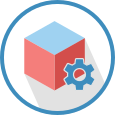
Activity execution
We provide necessary tools to concretely manage an "extended" company, i.e. a company consisting of individual production sites, multiple offices, customers, suppliers, construction sites and other collaborators with different mobility needs.
It becomes possible to trace, measure and process the information necessary to perform direct/indirect activities and to have a complete overview of what happens in the various departments thanks to a directly communication with all these entities.
Our solutions for production control support managing activities inside the plants, with the following targets:
- knowing the real stage of completion of orders and the time needed for theri fulfillment;
- managing the progress of production through batches, serial numbers, items;
- determining the time the equipment require for set-up, production and stand-by;
- minimise downtime due to lack of information about tasks to accomplish or materials’ whereabouts;
- adopting measures in case of downtime;
- analyzing efficiencies and inefficiencies.
Monitor the status of their machineries and, if need be, detect rapidly breakdowns are two basic elements to achieve proper maintenance management and obtain cost savings. A proper management allows to obtain:
- lower costs for unplanned stops;
- lower costs for lack of quality;
- lower energy costs;
- improvement in the management of the spare parts warehouse.
Through jpiano® it’s possible to, in addition to acquire data, rework and make available detailed information (including at the level of big data) about what is happening in individual departments, and trigger specific actions to facilitate remedial actions. In particular, companies can:
- collect, analyze and store data on the health status of individual machines and plant;
- do the performance comparisons between plants based on specific indicators (eg OEE, combination of availability, efficiency, and quality);
- identify breakdowns, stops and micro-stops to prevent them and to generate early warnings;
- obtain the necessary information to plan maintenance (preventive maintenance);
- generate the intervention plan with the steps to be performed.
Preventive Maintenance
The preventive maintenance is handled through the creation of specific orders to be performed periodically on a plant or on a part of it. In phases of planning activities must therefore take into account periods of unavailability due to maintenance of the system. In these cases, the system will signal the need to carry out his operations and make available electronic documentation related to the activities to be carried out.
Extraordinary Maintenance
In case of failure it is necessary to intervene promptly to minimize the downtime and cost associated with it. It therefore becomes important to quickly inform the personnel involved, perform the necessary diagnostic interventions, carry out repairs or program of specialized work with any purchase of spare parts.
Through jpiano®, following of a breakdown, it’s possible generate automatically alerts to be sent, by e-mail, text message or push notification, to the maintenance responsibles, providing clear visibility on system status.
Maintenance of condition
The maintenance of condition is accomplished through a monitoring system or part of it to check the state of health. It occurs in cases where the preventive maintenance is particularly onerous and that it’s why it can be particularly helpful to plan the maintenance on condition.
The knowledge of the wear state of plants and resources and the presence of specific on-board sensors for the acquisition of the main machine operating parameters can allow, in some cases, to anticipate critical situations, trends or various problems which may affect negatively on productivity.
Analysis time and costs of maintenance
By processing the information acquired on the blocked equipment and the actions taken you can perform a variety of assessments to plan any corrective action. It is possible to get information on times and maintenance costs, analyzes the causes of the stop and schedule supply of spare parts.
jpiano® allows to define and manage different areas dedicated to specific logistics operations (loading and unloading areas, physical location …). At the same time, with the introduction and spread of increasingly sophisticated identification systems (RFID, NFC, beacons, etc.), it’s possibile locate and track quickly every material or resource inside the company system. These features allow to ensure that the resources in the company and related elements, can be made available on time and in required places. More in detail, it’s possible to:
- define multiple internal and external warehouses;
- divide the warehouse into logical sections (loading and unloading areas, physical location);
- define compartments of the multi-dimensional mapping;
- identify materials and containers through barcode, RFID tags, beacons;
- track every movement of materials, resources and containers;
- do inventory periodically and manage any adjustments.
In order to support the manufacturing rhythm imposed by the market and ensure high quality standards it’s necessary to handle properly and quickly the material flow through the industrial system. According to the material requirements, the company have to be able to:
- generate a supply request at suppliers, subcontractors or external warehouses;
- perform every potential acceptance checks of the material that the computer system recommend;
- ecord the material entry and print an identification code for traceability;
- report the not receiving of a specific material caused by a failure to deliver or by the occurrence of non-compliance. In these cases it’s necessary to send an automatic reminder to the supplier.
Through jpiano® it’s possibile to:
- monitor in real time the processing of raw materials in order to keep under control inventory levels;
- automatically download or on user request the real production consumption and the taken quantity;
- calculate material requirements and generate the relevant purchase orders on the basis of real consumption of the company;
- manage all steps of the material supplying procedure (purchase request, request for proposal, evaluation estimates, automatic issuing of the order to the supplier, registration of supplier confirms, etc.);
- manage the acceptance procedures of incoming materials by performing the necessary required checks;connect each incoming material to an identification code to quickly retrieve associate information (system query, detecting non-compliance, etc.);
- manage eventual critical containers such as silos or special pallets. These require special management in terms of supply conditions, storage parameters, expiration date, etc…
Evaluate logistics as a transversal process integrated with production and management activities offers new opportunities to improve operational efficiency and increase the level of service provided to the customer in terms of quality, time and costs.
We provide software solutions that allow you to:
- schedule shipments based on information regarding deliveries requested by customers and the progress status of production orders;
- managing supplies of materials and semi-finished products
- manage shipments
- check the locations of materials and resources present in the factory.
A key requirement for a smooth production process is to be aware of availability, whereabouts and nature of the materials the company owns. Reaching this goal is possible only through the set up of automated systems to associate each material with information about:
- acceptance date, quality control results and supplier information for each raw material batch;
- location within the departments or warehouses;
- documentation of production advancement (dates of start/end process, involved operators, machinery and equipment used, process parameters, quantities produced, discarded, suspended and recovered…);
- freshmen and orders completed using that specific batch of material and/or serial specific;
The main advantages are:
- solving a series of problems related to the location of the property in the establishment and treatments that have been carried out;
- having a batch traceability, that is to maintain a link between materials, components and semi-finished products.
Identification can be made with different technological methods and devices, which are rated according to the application contexts.
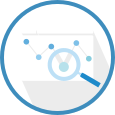
Real time monitor
We provide tools for the constantly monitoring both the availability of plants and/or individual machinesas well as the progress of customer orders and production orders. These tools based on the acquired data, show in real-time an up to date summary of indicators of productivity and efficiency .
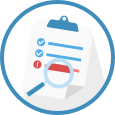
Quality controls
We provide right tools to plan and manage quality control plans in order to ensure the compliance of produced goods with the quality level requested by the customer.
It's possibile to assign control plans to specific items, family, supplier, customer, stage of work... and indicate for each one the individual activities to be performed (measurements, visual inspections, weighin...) with possibile direct acquisition of values from the devices used for measurements.
Upon request, the operator can carry out the checks necessary for approval of the production process.
To ensure the compliance of the products to the quality level required by custore (LQA - Leading Quality Assurance), different sampling plans (such as the Military Standard) can be performed.
The know-how acquired on the fiel allows us to implement sampling algorithms that take into account the specific needs of customer. The acquisition of information can be performed automatically or on request by operator. Any non-compliance or out of tolerance values are immediately highlighted in order to take appropriate action.
In addition to the work line control it may be necessary to carry out checks in an internal or external laboratory. You can trace the different stages of control lifecycle, such as:
- sampling;
- sending samples to the laboratory (container management, list samples...);
- result acquisition (electronically or with manual input);
- matching results related with orders.
To complete the testing process it may be required to perform specific operations. For example, in the case of testing of equipment subject to pressure, it's necessary to specific the origin of the individual components (serial number, casting, supplier...).
After completing the various control cycles you can print a certificate of compliance with the order with an indication of specific results. Certificates are made based on specific customer needs.

Sharing summary data
Since we want to concretely support all the people involved in business processes such as administrators, production managers, department managers, employees, team leader and operators, we offer a software solution with parameterized user interface that shows dfferent kind of information depending on the level of user profiling.
In particular, we also provide summary data and constantly updated reports relating to:
- production and process data broken down by plant, job order or time frame
- performance data broken down by customer, job order, order or item
- information aggregated by shift, day, week, month or year.


